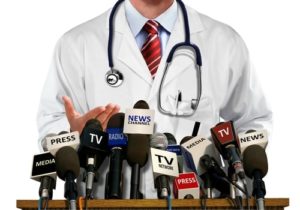Your Practical Guide to Handling a Spontaneous Media Interview

Doesn't happen in your little backyard? Actually, it does. There’s something of considerable local interest in the news all the time. A recent example was news of potentially contaminated drinking water on a school campus. Not surprisingly, students were sick and the news media reached out to hospital administrators and local physicians for input.
Local healthcare professionals were the perfect resources for providing vital information and advice to the public in a timely manner. But being available or responding to the local media isn't a happy accident. Preparation is vital to allow your expertise to shine through. And when it does, your name may be high on the media’s contact list as a future resource.
Here are 10 practical tips to smooth your professional commentary or medical insight when doing a media interview:
Polish your expert persona. If you're involved in community or professional presentations, you may be comfortable in front of the public. For others, it takes practice to be authoritative AND to appear at ease. Relax. Remember that "they" called you, so your expertise isn't something you need to prove.
Never answer a question with "yes" or "no." Always give a specific answer. If the reporter drops the ball and asks this kind of a question, consider how your perspective leads to an answer of more than one word.
Be succinct and direct. "In my expert opinion..." and similar stockpiled qualifiers are less effect than simply saying, "Two thousand people may have been exposed to unsafe drinking water."
Be brief. Make the most of your online, in-the-news spotlight. Members of the media may give you a heads-up before an interview. So if you have the preparation time, get the numbers, dates and details in advance that will make anticipated questions simple to answer.
Be truthful. If you don't have an answer, say so, but offer to find out. If you don't agree, explain.
Don't be evasive. Fishing for some kind of response when you're faced with a confusing or unknown answer looks bad and diminishes your expert reputation.
Slow down. Sometimes over-active nerves make it easy to talk over someone else's words. Listen carefully, and respond thoughtfully. It’s OK to pause and collect your thoughts. And speak in easily understood (non-technical jargon and non-medical) terms.
Don't make an interviewer hunt for the facts. If you have to be asked several times to get to an answer, you're wasting everyone's time. Get to the point quickly.
Everything you say is on the record. Regardless of what you’ve been told or promised, there’s no such thing as “off the record.” If you say it, you should expect to be quoted.
Establish a good post-interview rapport. Don't try to spin the information or ask when and how the interview will appear. A good reporter won't tell you. Don't ask to see the story before publication; that won't happen. If you are concerned that facts or figures are correct, reconfirm following the interview.
Enjoy yourself! It is flattering to be asked for your opinion. Handled properly, news media contacts—either promoted or solicited—bolster your personal and professional reputation and strengthen your status in the community and beyond.
Consider these key points when speaking with the press, the public and colleagues in the healthcare profession. If you're interested in additional tips about professional presentations, the fine art of “News Jacking,” or being the local expert voice, please contact us.
Related Articles:
Close Encounters of the Media Kind
Healthcare Publicity: Winning Techniques and Fatal Pitfalls to Your Free Press
The TV Camera is On You: Handling the Healthcare Interview
Reporters Can Be Digging for Dirt, Not Digging for Gold: A Healthcare PR Caution
Medical Practice Marketing: Successful Sound Bites Give Your Expertise a Media Voice









